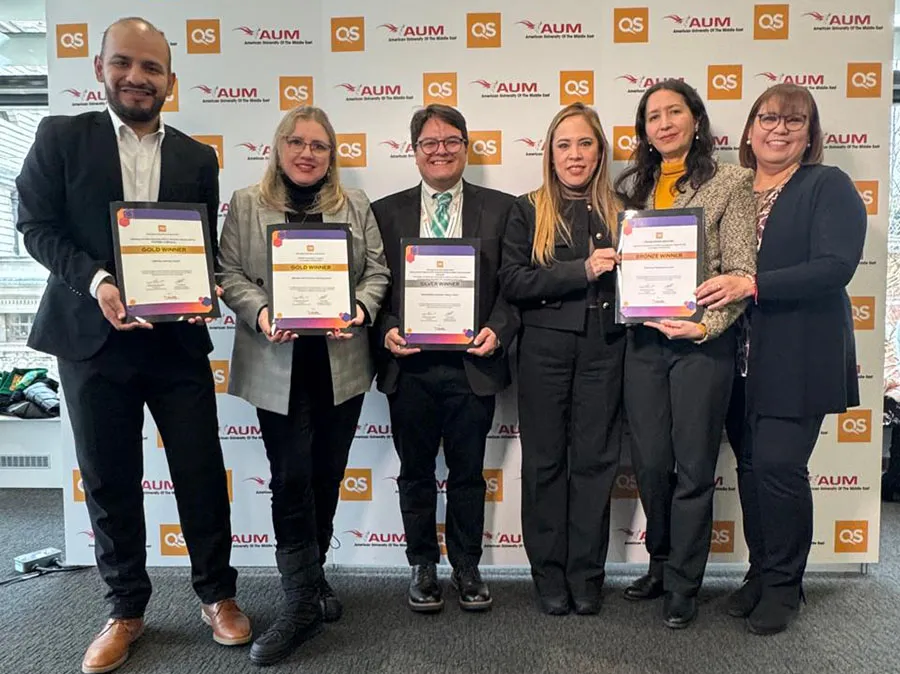For the fifth consecutive year, projects developed by Tec de Monterrey professors have been recognized at the 2024 QS Reimagine Education Awards, considered the “Oscars” of education.
The event is organized by British evaluation firm Quacquarelli Symonds (QS), creator of the QS World University Rankings, one of the lists of the world’s top universities.
“These awards motivate Tec de Monterrey to maintain our culture of educational innovation,” said Beatriz Palacios, Director of Educational Innovation and Digital Learning at Tec de Monterrey.
“This award not only reassures us that we can offer valuable educational solutions to our students but also shows also that these are highly recognized and valued by other institutions around the world,” she added.
“This award reassures us that we can offer valuable educational solutions to our students.” - Beatriz Palacios
Educational innovation: Here are the four winners
Here we present some details about the winning projects at the 2024 QS Reimagine Education Awards.
- Gold Medal: AGORA Ecosystem of Spaces
AGORA Ecosystem of Spaces, a project from the Department of Educational Innovation and Digital Education, won the gold medal in the Blended and Presence Learning category.
“Winning this award means that our educational innovations are bringing something new to the global challenges we’re facing in education,” said Patricia Aldape, Director of Learning Experience Innovation.
The AGORA Ecosystem consists of three innovative spaces that combine pedagogical models and strategies with cutting-edge technology to promote active, experiential, and memorable learning in students
“In the case of ‘AGORA Ecosystem of Spaces,’ it validates our vision that educational spaces are fundamental to fostering innovation, collaboration, and discovery.
“It confirms our commitment to creating environments that inspire, transform, and empower both students and teachers,” said Aldape Valdés.
The first of these spaces is the Hologram-Effect Professor (Holoroom), which recreates the natural dynamics of face-to-face environments where students interact in real time with their classmates and a hologram-effect professor.
The second space is the Hall Immersive Room (HIR), which offers an immersive experience using advanced audiovisual technology.
The third is the Extended Reality Classroom (XR-Room), which offers a dynamic and flexible environment to teachers for integrating learning experiences with Virtual, Mixed, and Augmented Reality into their classes.
- Gold Medal: Cultivating Complex Reasoning Skills to Empower Lifelong Learners
Also winning a gold medal in the Lifelong Learning category was a project from the Institute for the Future of Education: Cultivating Complex Reasoning Skills to Empower Lifelong Learners.
“It’s a huge honor that recognizes the effort and passion of all of us who make up the R4C-IRG research group. This award reflects our commitment to educational innovation and creating solutions that truly impact people’s lives.
“It confirms we’re on the right path, promoting lifelong learning as key to adapting to a constantly changing world,” said research professor Jhonattan Miranda.
The project aims to improve reasoning skills by developing strategic projects based on principles that include an open educational model, empowering participants to face global challenges with critical, innovative, systemic, and scientific thinking.
“This award is the product of many people, from the vision of rectors and directors in supporting research through the Challenges Program to its execution by the researchers.
“All of this is supported by administrative staff, students, professors, academic communities, business leaders, suppliers, government, civil society, and above all, by our families, who are the main source of support for all our work,” said Dr. María Soledad Ramírez.
For her part, Dr. Inés Álvarez spoke about the importance of interdisciplinary collaboration in achieving this award.
“Receiving this award, which is a collective achievement, highlights the importance of interdisciplinary and cross-sector collaboration. We take great pride in being able to contribute to what this institution is building for a better future and to reach as many people as possible.
“The human and capital resources invested are starting to be reflected in these achievements, which have an increasingly significant impact on the communities we serve,” she said.
- Silver Medal: Cross-Cultural Classroom (3C): Empowering Future Leaders with Sustainable Citizenship
The School of Engineering and Science’s Cross-Cultural Classroom (3C) project won the silver medal in the Sustainability Education Literacy category.
“As teachers, winning this international award from QS is a real joy, satisfaction, and recognition of our ideas, creativity, collaboration, work, and innovation,” said Professor Eduardo Juárez.
It consists of a collaboration between the Tec, the University of Hong Kong, the International Islamic University Malaysia, and Srinakharinwirot University in Thailand.
In this collaboration, professors and students from these four universities, originating from eight countries and studying eleven academic disciplines, participate in a learning experience to build a better future.
It’s a way to better understand ourselves as humanity and develop local solutions on a global scale.
“As citizens, it’s an invitation to strengthen and replicate intercultural classrooms so that as universities, we continue to take greater responsibility for building a better future for our planet,” said Juárez.
- Bronze medal: TecDrone, Assessment of STEM Competencies using VR & AI
TecDrone: Assessment of STEM Competencies using VR & AI, a project from the Department of Educational Innovation and Digital Education, won the bronze medal in the Learning Assessment category.
“Winning with TecDrone represents a solution to the challenge of skill assessment, connecting theory and practice,” said Ana Gabriela Rodríguez, Director of Educational Innovation.
TecDrone is an authentic engineering skills assessment experience that connects students to real-life challenges where they research, build, and test drones in a virtual reality environment.
In this scenario, students make key decisions related to drone design and application, facing practical situations that simulate real-world challenges.
“Skills assessment is a major challenge in education, since it requires observing how students consciously apply their knowledge to solve situations that reflect reality.
“Receiving this recognition shows we’ve taken an important step in this direction, since our technological support means that students can demonstrate their learning in an authentic and innovative way, while teachers can assess the performance of each of their students more efficiently,” said Adriana Plata, Head of Educational Innovation.
At the end, students interact with an AI avatar to explain their choices, while teachers obtain a detailed review of the results and the level of skill attainment via a dashboard.
This allows for a more accurate and consistent assessment, which isn’t just focused on a grade but on a real interpretation of students’ development of technical and decision-making skills.
“In this case, we’ve overcome the difficulty of authentically assessing skills,” said Ana Gabriela Rodríguez, Head of Educational Innovation.
“This innovation helps ensure that students apply what they’ve learned in concrete situations and also offers a consistent and effective assessment, preparing future engineers to tackle global problems with real-world solutions,” she added.
QS Reimagine Education Awards 2024
This year, 14 projects developed at Tec de Monterrey were announced as finalists in the 2024 QS Reimagine Education Awards, considered the “Oscars” of education.
The award is divided into 18 categories and evaluates innovative programs, technology, and pedagogical approaches that revolutionize education.
Each year, over 1,200 projects from all over the world are submitted, which are then subject to an evaluation process by an international jury of more than 900 specialists.
This year they’re celebrating eleven years of recognizing pioneering pedagogical approaches that improve learning outcomes and employability, as well as effective methods for teaching about sustainability.
The 2024 awards were held from December 9 to 11 in London, during the QS Reimagine Education Conference.
Smart Forests, a project by Brazilian university FACENS, and Engage, Empower, Excel: PolyU’s Smart Campus Innovation project by the Hong Kong Polytechnic University, are the joint winners of the Global Education Award.
The award includes a cash prize of 25,000 dollars, which will be shared between both winners.
The Global EdTech Award was awarded to ZNotes, a community-driven online platform. By offering free access to high-quality learning resources and peer-learning support, ZNotes has reached 6 million students worldwide.

ALSO READ:





